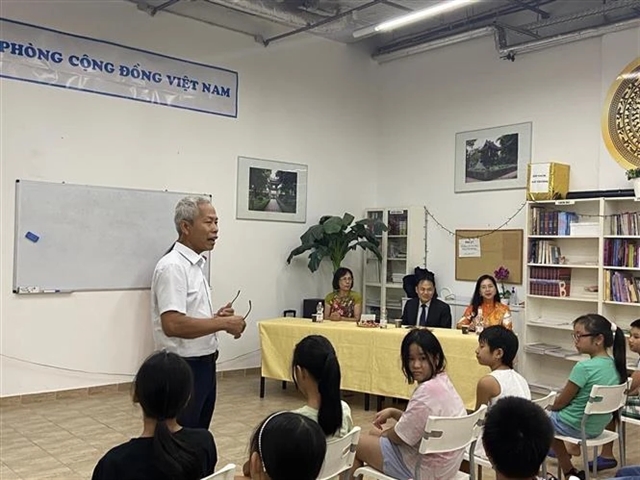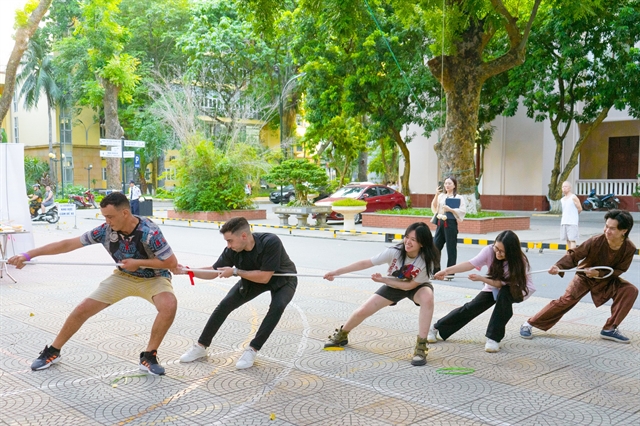 Life & Style
Life & Style

By Quỳnh Anh*
In the vibrant tapestry of a nation’s culture embodied in various elements, such as cuisine, clothing, music, dance and architecture, language serves as a powerful thread that weaves together diverse identities and experiences.
It is not just a tool for communication, but a vital element that distinguishes one nation from another.
Beyond its basic benefits, language acts as an invisible bridge that connects souls, fostering harmony, understanding and love among people.
 |
| A Vietnamese class with lots of funny games. — Photo courtesy of Hanoi Exploring |
Stepping into a small room in Cầu Giấy, Hà Nội, on a weekend afternoon, you will be struck by the sight of people from various ages and backgrounds, all attentively engaged in a shared passion: learning Vietnamese.
Welcome to Hanoi Exploring, a Vietnamese language class for foreigners that offers two free sessions each week.
Here, international friends can feel a deeper connection to Việt Nam and making it feel more like home.
Listening intently, jotting down notes and confidently asking questions, Jaol Samuel Reis from Portugal immersed himself in the class experience.
“The Vietnamese language is very different from all other languages that I've learned,” Jaol Samuel Reis told Việt Nam News.
“It's a very tonal language, which made things more difficult for me.
“I believe that these classes are very useful. “They provide me the foundation for me to learn and to study and interact with people around me.”
Every weekend afternoon, the class offers two sessions, typically with students attending one and returning for the next.
 |
| Attentive learners in a lesson. VNS Photo Quỳnh Anh |
However, Dionne Anderson, an American entrepreneur with a busy schedule, chose to make the most of her free time by attending both sessions back-to-back.
“For a long time, I tried to stay away from languages with intonation. But with Vietnamese, it's impossible,” she said.
“That for me is the hardest part is the pronunciation of the words I'm not used to making such sounds with my mouth
“I think it's great to be able to talk with people who are Vietnamese and who are expats and you can get everybody's opinion and experience, so I think it’s really good and I like this place a lot so much; it's cool.”
 |
| Vietnamese is challenging to foreigners. VNS Photo Quỳnh Anh |
From basic introductions, like your name and age, to expanding vocabulary to express interests, George Batyrov from Belarus patiently practises Vietnamese, trying to articulate each word with precision.
“Your pronunciation is just unbelievable,” George said.
“I cannot even understand the difference between some pronunciation. For me, it's just intonation. For you, it's just different words. I hope I will get it.”
Vietnamese enchants with its melodic tones and profound meanings.
As one of the more complex languages, achieving fluency can be challenging for foreigners without early immersion.
Jaol added: “If I say, for example, ‘dừa’, I believe that means a coconut. But I might have said ‘dứa’, which is a pineapple.
“Sometimes it's difficult for Vietnamese native speakers to understand what I'm saying.
“The other day I just wanted a sugar cane juice, but I ordered something else, so I had to explain myself to the lady to bring in the right juice.
“I believe that many foreign people struggle with these tonal aspects of the language. But I'm doing my best to improve and to learn.”
Teacher Lê Thị Oanh said: “American people often have trouble pronouncing ‘t’, ‘th’’, and ‘d’.
“They often put ending sounds in words like ‘Duc’. They pronounce it: ‘Duk’”
In addition to captivating lessons, meaningful activities foster a deeper understanding of Vietnamese culture for foreigners.
“It is a place where they can come with no obligation, and there's still a lot of fun,” American Josh Conaway said.
“At the same time it's a substantial resource to learn the language without having to spend money. I think that's a very important resource for people".
“I really enjoy and appreciate that they have something like this here.”
 |
| Member of the class played Vietnamese traditional game. Photo courtesy of Hanoi Exploring |
In the era of global integration, cultural exchanges have become a prominent trend, highlighting the unique treasures each culture offers.
Language plays a pivotal role, ensuring cultural diversity, and facilitating interaction between cultures.
At this Vietnamese class, instructors enrich their own understanding while sharing the language, creating a vibrant cultural dialogue.
Trần Thế Thành, a representative of Hanoi Exploring, said: "We offer a free Vietnamese class on Saturday for them to exchange.
“Our Vietnamese students can practise their English and teach Vietnamese to foreigners. I think it’s good for both Vietnamese students and foreigners.
"I feel that I have a strong connection with foreigners. The Saturday class helps us enhance that connection, like members of a family.
Additionally, the daily effort to share the Vietnamese language has deepened Lê Thị Oanh's love for her homeland's tongue.
“When I studied Vietnamese culture and language to teach them, I found it very interesting,” she added.
“I want to study more and more.” - VNS
 |
| An enthusiastic teacher (left) guides her learner patiently. VNS Photo Lê Hương |
* (with additional interview by Lê Hương)




